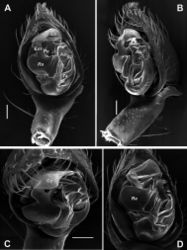Sestakovaia hyrcania
| Notice: | This page is derived from the original publication listed below, whose author(s) should always be credited. Further contributors may edit and improve the content of this page and, consequently, need to be credited as well (see page history). Any assessment of factual correctness requires a careful review of the original article as well as of subsequent contributions.
If you are uncertain whether your planned contribution is correct or not, we suggest that you use the associated discussion page instead of editing the page directly. This page should be cited as follows (rationale):
Citation formats to copy and paste
BibTeX: @article{Zamani2021ZooKeys1054, RIS/ Endnote: TY - JOUR Wikipedia/ Citizendium: <ref name="Zamani2021ZooKeys1054">{{Citation See also the citation download page at the journal. |
Ordo: Araneae
Familia: Liocranidae
Genus: Sestakovaia
Name
Sestakovaia hyrcania Zamani & Marusik, 2021 sp. nov. – Wikispecies link – ZooBank link – Pensoft Profile
Type material
Holotype ♂ (NHMW), Iran: Golestan Province: 10 km SW of Shahpasand, 26.4.1972 (G. Pretzmann).
Etymology
The species name (a noun in apposition) refers to the historical region in south-east of the Caspian Sea in modern-day Iran and Turkmenistan which lies between the coastal line to the north-west, the Alborz Mountains to the south, and the Kopet Dag Mountains to the east, in which the type locality of the new species is situated.
Diagnosis
The new species differs from S. annulipes comb. nov. by having the RTA bent almost at a right angle and with a pointed tip (vs RTA bent at a lesser angle and its tip rounded), a wider embolus (Em) and process of the embolus (Pe), and the embolus located prolaterally in relation to the process (vs embolus mesal and process prolateral).
Description
Male. Habitus as in Figure 4D. Total length 4.37. Carapace 2.06 long, 1.58 wide. Eye sizes: AME: 0.13, ALE: 0.11, PME: 0.09, PLE: 0.12. Carapace, labium, chelicera, maxilla and sternum light brown. Carapace with darker submarginal longitudinal bands. Legs yellowish-brown, with numerous darker patches. Abdomen dorsally greyish with lighter chevron markings, ventrally lighter without any markings. Spinnerets light grey, unicolourous. Measurements of legs: I: 6.54 (1.72, 0.85, 1.69, 1.32, 0.96), II: 5.73 (1.31, 0.66, 1.66, 1.30, 0.80), III: 5.82 (1.46, 0.71, 1.38, 1.63, 0.64), IV: 8.25 (2.10, 0.88, 1.96, 2.25, 1.06).
Palp as in Figures 9A–C, 10A–D; RTA about 2 times shorter than tibia, bent almost at a right angle, tip pointed; cymbium 1.6 times longer than wide; bulb ca 1.3 times longer than wide; tegulum with 2 apophyses: long tegular apophysis (Ta) with hooked tip, and broad anterior apophysis (Aa); conductor (Co) lamellar/membranous, large, almost as wide as radix; embolus complex: with broad radical part (Ra), broad embolus proper (Em) and mesal embolic process (Pe).
Female. Unknown.
Distribution
Known only from the type locality in Golestan Province, northern Iran.
Original Description
- Zamani, A; Marusik, Y; 2021: A new genus and ten new species of spiders (Arachnida, Araneae) from Iran ZooKeys, 1054: 95-126. doi
Images
|
Other References
- ↑ Dimitrov D, Naumova M (2021) A faunistic survey of the spiders (Arachnida: Araneae) of Sakar Mountain, Bulgaria.Arachnology18(7): 689–699. https://doi.org/10.13156/arac.2020.18.7.689

![Figure 9. Male palps of Sestakovaia hyrcania sp. nov. (A–C) and Sestakovaia annulipes comb. nov. (D) A, D ventral B retrolateral C dorsal D after Dimitrov and Naumova (2021)[1]. Abbreviations: Aa – anterior apophysis, Co – conductor, Em – embolus, Pe – embolic process, Ra – radix, Ta – tegular apophysis. Scale bars: 0.2 mm.](https://species-id.net/o/thumb.php?f=Zookeys-1054-095-g009.jpg&width=143)
